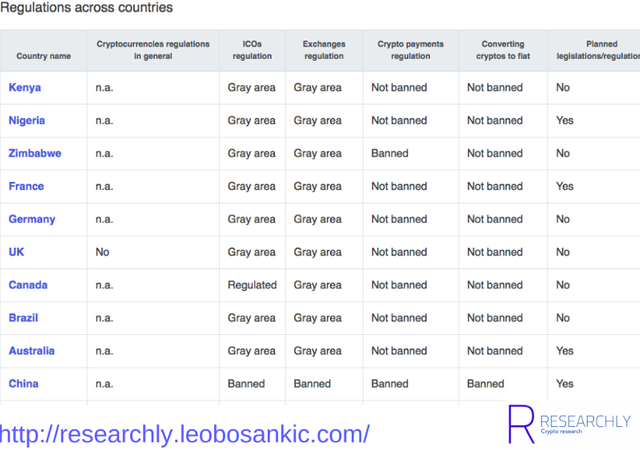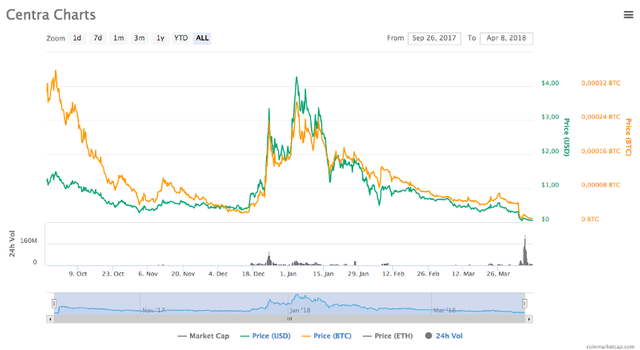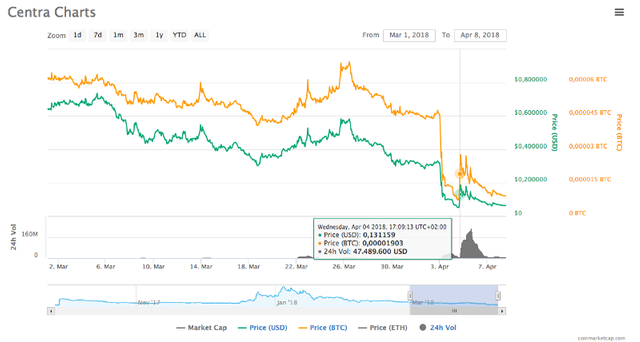Allegations against Centra and implications for self-governance
The last couple of days have been full of regulations-related news:
The SEC charged Sohrab “Sam” Sharma and Robert Farkas, the co-foudners of Centra [4] (More about the SEC here).
The FCA (UK’s financial regulatory body) issued a statement claiming that certain cryptocurrency-related activities will require authorisation by the FCA (“It is likely that dealing in, arranging transactions in, advising on or providing other services that amount to regulated activities in relation to derivatives that reference either cryptocurrencies or tokens issued through an initial coin offering (ICO), will require authorisation by the FCA. […]”) [3]
Also, Iran published a statement on Telegram in the context of Telegram’s ICO [6] claiming, among other things, that they want to ban Telegram.
Finally, bitcoin.com reports that “Danske Bank Bans Investments in Cryptocurrency-Related Instruments” [5]More about regulations here
Selected overview of crypto regulations worldwide (Source researchly)

Find full overview of crypto regulations here
Centra’s case is quite interesting for the whole industry, so let’s look at it in more detail.
Centra’s actions resulted in price and — probably — trust loss
Centra offers several blockchain-related products such as a wallet and prepaid cards. (More about Centra here).Centra seems to be still operational but their price has fallen to almost zero.

Source: Coinmarketcap.com
As I have argued in “Verge’s impromptu crowdfunding: odd timing, potential for backfiring, example for short-term financing and two approaches towards diffusion“ the issue with such news is not necessarily the price — which can recover — but rather the loss in trust — which can, of course, also recover — but certainly not as easily. In the case of Centra, however, I doubt that will happen. For starters, Binance delisted Centra [1]. More importantly, Centra’s price movements in the context on the SEC news has something of a pump-and-dump taste to it. Looking at Centra’s short-term chart one can see how the coin doubled on April 4.

Source: Coinmarketcap.com
That is especially od as the SEC statement was made public two days prior on April 2.Based on these price movements TeetTot2456’s argument from reddit that “Its a pump and dump coin its being manipulated so whales can get out.“ [2] could give some indication for what’s going on.I am personally not interested in judging that price movement, but I am interested in thinking — once again — about the implications of such publicly visible actions.
Centra’s action might be considered “yet another crypto-related fraud”
Centra’s action is for many yet another example that cryptocurrencies are associated with fraud. Whereas there is no doubt about that connection, in this particular case the fraud was nothing crypto-specific or enabled by cryptos but simply false claims that everybody could have done in any other industry (the SEC’s allegations are against allegedly false claims made by Centra). Nevertheless, I believe that such a distinction won’t be made in the „general public“. Despite that wrong classification, however, on must not forget that there is indeed a legitimate reason to classify Centra’s actions as „crypto-specific fraud“. That reason is the mere fact that investors were „lured“ into investing money. Whereas in any other non-crypto industry companies can also issue false claims they cannot collect money from people as it is possible in the crypto world.And this last part — „average“ investors being „lured“ — is what I believe to be another very important aspect.
Adapting legislation to technology (or vice versa)
The current situation is simply that investors bear far more responsibility than with other investments vehicles. For sure, one can lose everything when investing in other financial products such as stocks or even bonds, but there a — due to the regulations — less scams than in the crypto world. With Centra and other projects where the SEC intervened authorities are trying to regulate the industry. By that, they also take away some responsibility from investors and make investing less risky (although still very risky). The question with that constellation then is whether that’s good. By regulating the industry, governments are taking away one of the fundamental things that make ICOs so unique — the easy to raise money. By trying to make the new technology fit the old „world“ they are making the new technology less „new“. At the same time, however, they also make it more difficult to rise money on false claims.Generally speaking, the rationale should then be to adapt the legislation to the technology and not the other way round. However, that change of legislation assumes that the technology at hand provides — when extrapolated into the future — does something good to society. Then, and only then, it makes sense to allow the technology to prosper.
Making the “wild west of cryptocurrencies” the new normal
Going now deeper into how such a legislation would look like one avenue would be to allow the current „wild west of cryptocurrencies“ to exist as it is without any involvement from authorities. This would require
- highly self-responsible individuals
- algorithms that support decision making
- a community that establishes best practices and rules on its own
- community members that punish the negligence of self-imposed rules
Looking at the „Internet“ we can see a growing number of those “highly self-responsible individuals“ growing through AirBnB, Uber and other „sharing companies“. Every participant of those platforms relies — of course — on some extend on those platforms to ensure a certain level of quality but much is decided by algorithms (e.g. a driver’s Uber score) and born by the individuals using those platforms (e.g. an AirBnB bears the responsibility that his host isn’t a criminal — that’s usually not a concern with hotels).Regarding community-based governance we can see that play out in a range of online communities with voting systems. ICOs are one obvious examples; no central instance every imposed the „importance“ of white papers, best practices for issuance models or the right raised amount.That being said there has been a mindset shift towards decentralized, community-based and self-responsible individuals, cryptos have just introduced it in a very radical way. How that “social experiment“ will end is yet completely open but if we really want it we must acknowledge that some people — like Centra investors — will get burnt and that with unregulated freedom come high risks.
Notes
[1] https://www.crypto-roadmaps.com/single-post/2018/04/04/Binance-Delists-Centra
[3] https://www.fca.org.uk/news/statements/cryptocurrency-derivatives
[4] https://www.sec.gov/news/press-release/2018-53
[5] https://news.bitcoin.com/danske-bank-bans-investments-cryptocurrency-related-instruments/
[6] https://news.bitcoin.com/iranian-officials-issue-contradictory-statements-regarding-telegram-ban/Originally published at researchly.leobosankic.com on April 8, 2018.